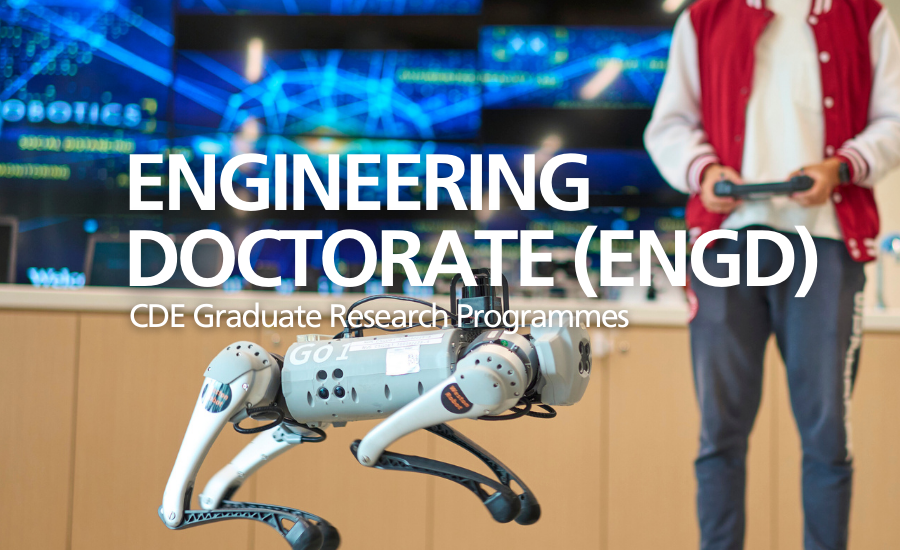
OVERVIEW
The Doctor of Engineering (EngD) programme aims to offer a qualification which, whilst being equivalent in status and challenge to the PhD, is more appropriate for those pursuing professional rather than academic careers. EngD is an earned doctorate, just like the PhD, but is based on industrial R&D rather than academic R&D.
Programme Features
The EngD focuses on research of industrial importance, endorsed by a supporting company which hosts the student as an employee for the duration of the EngD candidature. The student is jointly supervised by an NUS academic and a technology expert in the company. To train students for the commercial workplace, courses on engineering management are mandatory. Students trained in the EngD programme are therefore well-prepared for a career in industrial research.
The essential differences between EngD and PhD can be summarized as:
- EngD research has a much deeper industrial focus
Projects are usually initiated by the company. The student is typically a full-time salaried employee of the company, which provides co-supervision, thereby ensuring a continuing engagement in the technical research throughout the EngD candidature. - Mandates substantial technology management coursework
At least half the courses to be read by an EngD student must be in technology management, in order to prepare the student for a career in technology innovation and enterprise, as opposed to academic research.
All students who have successfully completed their requirements under this programme will be awarded the Doctor of Engineering.
Other essential differences between EngD and PhD can be found here.
Applicants
Programme Requirements
The existing established academic rigour of PhD will apply, including prevailing requirements on:
- Admission Criteria
- Continuation Requirements
- Academic warning; Probation
- Dismissal
- Degree Requirements
- English language (where required)
- Qualifying Examinations
- Seminar Course
- Thesis & Oral Defence Examination
While the following applies to EngD students only:
- Coursework comprising 32 Units
of which at least 50% must be courses on Management of Technology/Business/Industrial Engineering courses. For the list of courses, click here
- Exclude reading EG5911R
Application
Candidates must have confirmed sponsoring companies, and at least one academic thesis advisor, before initiating the application.
Industry Partners
Finding a Matching Thesis Advisor
Companies interested in EngD with existing contacts in NUS CDE may approach their contacts directly. Otherwise, NUS CDE Vice-Dean (Research & Technology) and NUS CDE Vice-Dean (Graduate Programmes) can help to link companies to suitable academic staff.
Role of Industrial Advisor
The role of the industrial advisor is to:
- Serve as a liaison between NUS CDE and the company on all matters related to the research project and/or the student.
- Facilitate the student’s research activities within the company.
- Ensure that sufficient amount of time is devoted by the student on the project.
- Alert NUS CDE with regards to potential problems in the student’s research progress.
- Familiarize the student on the industrial aspects of the student’s research project.
- Provide the industrial perspective to guide the student in his/her research.
Funding
Research projects deemed suitable for EngD follow the PhD-IPP workflow for approval. This mode may involve a funding agency, other than the company itself. If so, a typical tripartite framework would be:
- Funding agency provides sponsorship to the students, including tuition fees for a stipulated period (normally four years for EngD), salary subsidy, grant for R&D and project-related fees for NUS CDE to run this programme.
- Company provides part of salary, mentorship and research facilities, project-related fees.
- NUS CDE provides mentorship, research facilities and ensure academic rigour.
- Companies may need to approach the relevant funding agency on being a participating company under the IPP mode.
Contractual Agreement
An EngD Participation Agreement between the company and NUS CDE is typically drawn up. It stipulates details on the research project, funding and Intellectual Property matters.
NUS CDE Staff Members
The documents on the processing for EngD can be found in a secured website for selected staff here
This is a central repository of working documents for CDE Department Graduate Research Programme Managers and administrative staff members.
Following successful discussions with the industry partner, the “EngD Project Proposal Form” is to be completed before each application’s intake deadline, for submission to the administrative staff of your Department. Please approach your Department for more details.
College of Design and Engineering, NUS
Blk EA #06-16
9 Engineering Drive 1
Singapore 117575



